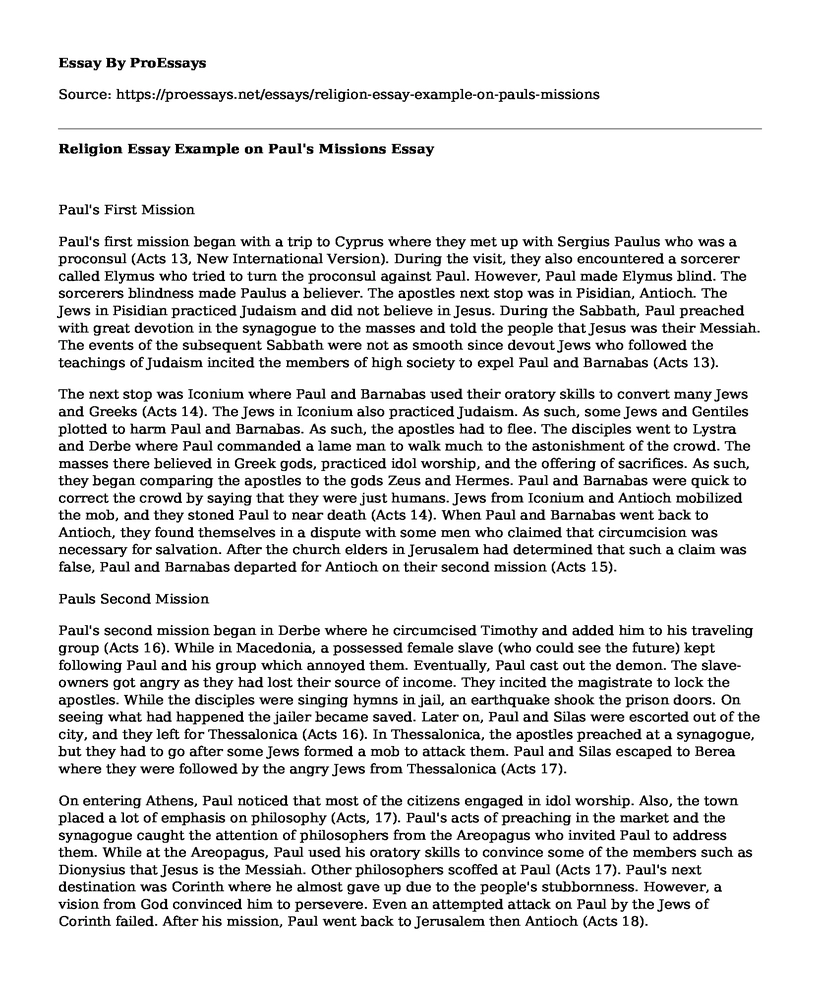Paul's First Mission
Paul's first mission began with a trip to Cyprus where they met up with Sergius Paulus who was a proconsul (Acts 13, New International Version). During the visit, they also encountered a sorcerer called Elymus who tried to turn the proconsul against Paul. However, Paul made Elymus blind. The sorcerers blindness made Paulus a believer. The apostles next stop was in Pisidian, Antioch. The Jews in Pisidian practiced Judaism and did not believe in Jesus. During the Sabbath, Paul preached with great devotion in the synagogue to the masses and told the people that Jesus was their Messiah. The events of the subsequent Sabbath were not as smooth since devout Jews who followed the teachings of Judaism incited the members of high society to expel Paul and Barnabas (Acts 13).
The next stop was Iconium where Paul and Barnabas used their oratory skills to convert many Jews and Greeks (Acts 14). The Jews in Iconium also practiced Judaism. As such, some Jews and Gentiles plotted to harm Paul and Barnabas. As such, the apostles had to flee. The disciples went to Lystra and Derbe where Paul commanded a lame man to walk much to the astonishment of the crowd. The masses there believed in Greek gods, practiced idol worship, and the offering of sacrifices. As such, they began comparing the apostles to the gods Zeus and Hermes. Paul and Barnabas were quick to correct the crowd by saying that they were just humans. Jews from Iconium and Antioch mobilized the mob, and they stoned Paul to near death (Acts 14). When Paul and Barnabas went back to Antioch, they found themselves in a dispute with some men who claimed that circumcision was necessary for salvation. After the church elders in Jerusalem had determined that such a claim was false, Paul and Barnabas departed for Antioch on their second mission (Acts 15).
Pauls Second Mission
Paul's second mission began in Derbe where he circumcised Timothy and added him to his traveling group (Acts 16). While in Macedonia, a possessed female slave (who could see the future) kept following Paul and his group which annoyed them. Eventually, Paul cast out the demon. The slave-owners got angry as they had lost their source of income. They incited the magistrate to lock the apostles. While the disciples were singing hymns in jail, an earthquake shook the prison doors. On seeing what had happened the jailer became saved. Later on, Paul and Silas were escorted out of the city, and they left for Thessalonica (Acts 16). In Thessalonica, the apostles preached at a synagogue, but they had to go after some Jews formed a mob to attack them. Paul and Silas escaped to Berea where they were followed by the angry Jews from Thessalonica (Acts 17).
On entering Athens, Paul noticed that most of the citizens engaged in idol worship. Also, the town placed a lot of emphasis on philosophy (Acts, 17). Paul's acts of preaching in the market and the synagogue caught the attention of philosophers from the Areopagus who invited Paul to address them. While at the Areopagus, Paul used his oratory skills to convince some of the members such as Dionysius that Jesus is the Messiah. Other philosophers scoffed at Paul (Acts 17). Paul's next destination was Corinth where he almost gave up due to the people's stubbornness. However, a vision from God convinced him to persevere. Even an attempted attack on Paul by the Jews of Corinth failed. After his mission, Paul went back to Jerusalem then Antioch (Acts 18).
Pauls Third Mission
Paul's third mission began with a trip to Ephesus where he baptized some disciples with the Holy Spirit since they had only been baptized by water (Acts, 19). During his stay in Asia, Paul performed numerous miracles, and even the clothes he touched were used to heal others. However, most people in Ephesus worshiped the god Artemis. Thus, Paul's activities angered Demetrius whose occupation was to make silver idols of the god Artemis. Demetrius rallied a mob and tried to have Paul lynched. The city clerk prevented such an act since he did not see any evidence of blasphemy or insult leveled against Artemis by Paul (Acts 19).
Paul's mission then took him to Greece then Troas (Acts 20). Paul had to leave Greece because some Jews had plotted to kill him. In Troas, Paul raised Eutychus from the dead. Eutychus had fallen from the third floor while Paul preached. After Troas, the apostle Paul went to Miletus where he spoke to the elders of the church in Ephesus. Paul talked to them at length, prayed with them, and then bade them farewell. That marked the end of Paul's mission as he headed back to Antioch (Acts 20).
Cite this page
Religion Essay Example on Paul's Missions. (2021, Apr 01). Retrieved from https://proessays.net/essays/religion-essay-example-on-pauls-missions
If you are the original author of this essay and no longer wish to have it published on the ProEssays website, please click below to request its removal:
- The Impacts of Immigration on Families and Children Paper Example
- Essay Sample on Culture's Viewpoint on Christianity
- Essay Sample on Exploring Spirituality: Oncology and Beyond
- Essay Sample on Christian Hymnody: Expressing Worship & Praise to God
- A Critical Assessment of Etienne Gilson's "God and Philosophy"
- Christianity and Politics: A Complex Relationship - Essay Sample
- Essay Example on Cross-Cultural Challenges for Social Workers: Navigating Language & Meaning







